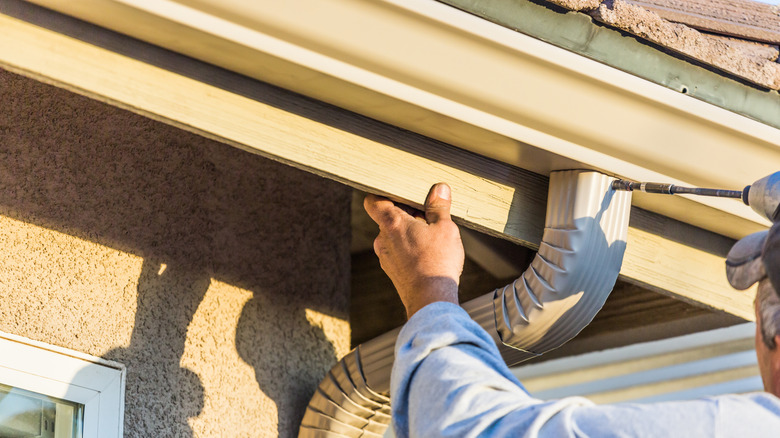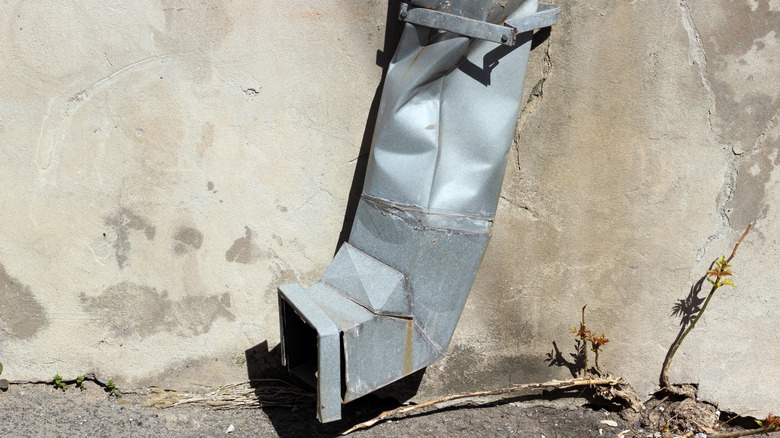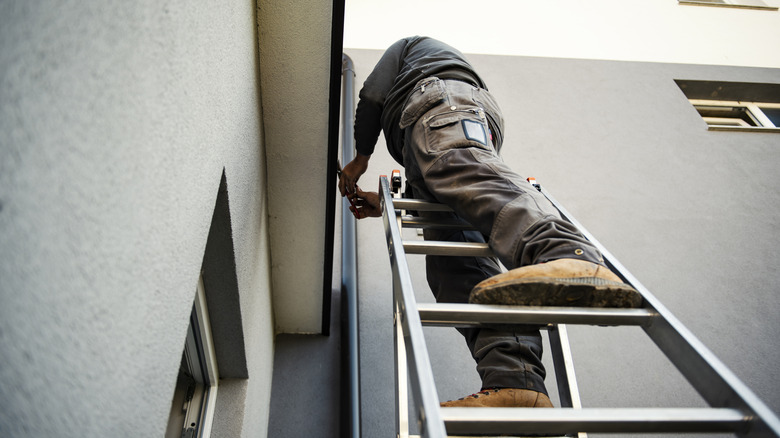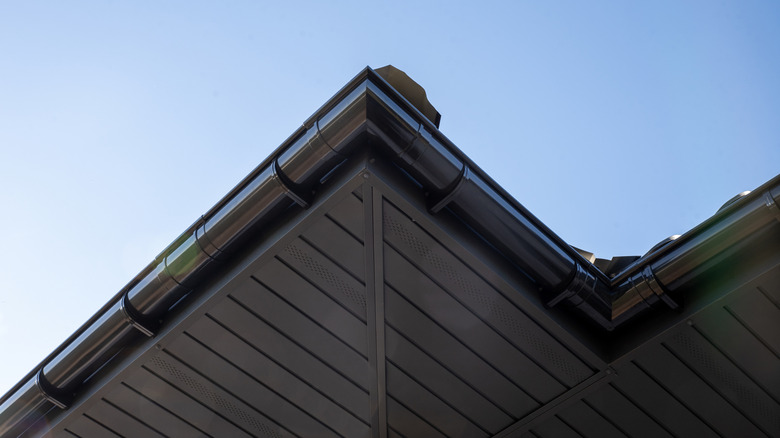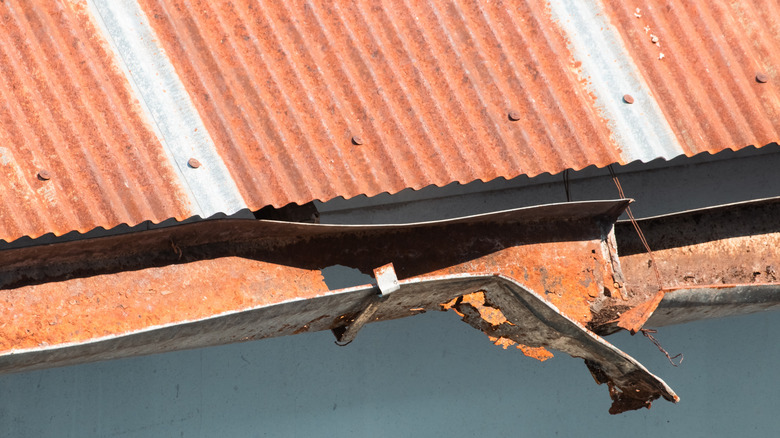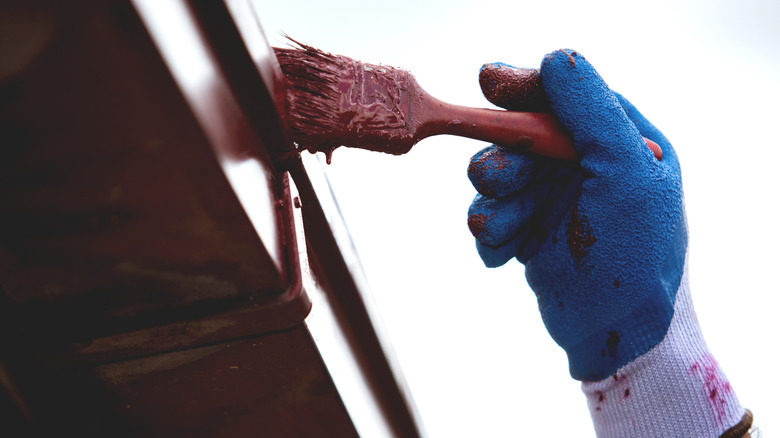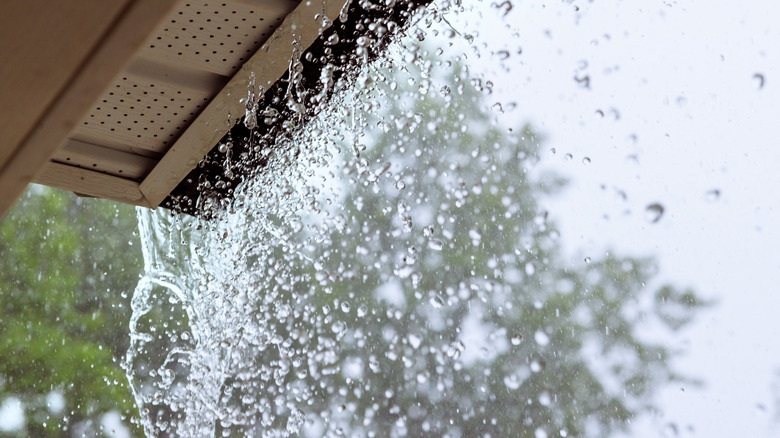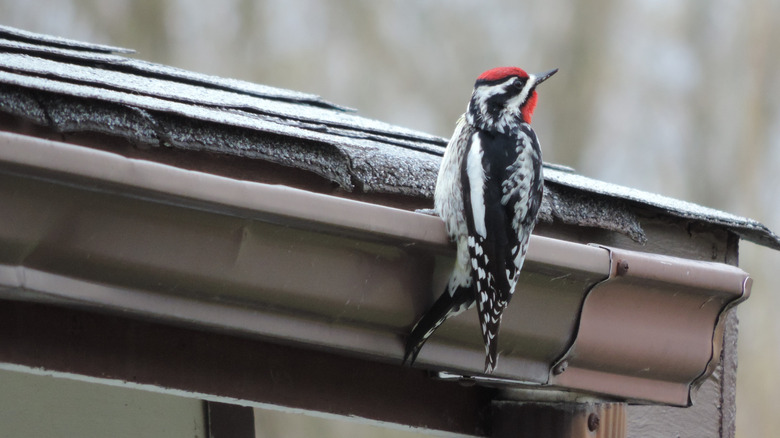The Biggest Reasons You Should Ditch The Metal Rain Gutters (And What To Use Instead)
We may receive a commission on purchases made from links.
When it comes to rain gutters, metal is the most popular choice for homes in the United States. In fact, a big majority of gutters and downspouts in the country are made from aluminum, and some experts predict this trend will continue for years to come. However, despite its popularity, metal may not always be the best option, and it certainly isn't the only one. Depending on where in the country you live, your home's design, and your personal preference, there are different types of gutters and other options that could be a better fit for your home.
Not only are some of these alternatives more durable and longer-lasting, but some of them are also more cost-effective, more aesthetically pleasing, and easier to maintain. Ready to see what life beyond metal gutters can look like? Read on to learn about the biggest reasons to ditch metal rain gutters and what you can use instead.
When metal gutters dent, the damage isn't only cosmetic
One of the biggest downsides to metal gutters, especially aluminum ones, is that they can dent fairly easily. These dents can be caused by a number of factors, including weather, fallen debris, and incorrect maintenance (i.e., using a straight ladder to reach your gutters instead of an A-frame). While some people may think that these dents are only an aesthetic issue, the reality is that dents can make your gutters less functional. Dents can cause debris to get trapped in your gutters and shorten your gutters' lifespan by making them more likely to crack or corrode.
If you don't want to worry about dents, vinyl gutters are an alternative. Since they are made of plastic, vinyl gutters are resistant to dents. This can make them an especially attractive option for people who live in places with severe storms and hail. However, a major downside to vinyl gutters is that they have a fairly short lifespan. Vinyl gutters typically last for around 10 years, while aluminum gutters can last for 25 years, and stainless steel and zinc gutters can last for 50 years.
Metal gutters can be heavy and difficult to install
Did you know that almost all of the ladder accidents in the United States occur at home or on farms? That's certainly something to think about before making the decision to install your own gutters. Even if you feel comfortable on a ladder, metal gutters, especially copper, can be incredibly heavy and challenging to install properly. If you live in a two-story home, DIY gutter installation can be even more difficult and it would probably be wiser to consider calling in a professional versus DIYing your gutter installation.
If you have a single story home and wish to DIY the install, then you may want to stay away from metal gutters entirely and opt for an alternative like vinyl gutters, which are lighter and a little more DIY-friendly. For an even simpler installation you can skip the downspouts and opt for rain chains. Rain chains are decorative chains that help guide water from the roof of your home to the ground and can be installed in a few fairly simple steps. You can even purchase a rain chain installation kit (like this Monarch Aluminum 3-Piece Rain Chain Installation Kit) to make the process easier. It's important to note that while rain chains are often used in conjunction with gutters, they can also be installed on homes without gutters. Here are some of the various ways rain chains can benefit your garden.
There are cheaper alternatives to metal gutters
Let's be real, cost is usually the first thing people consider before starting any kind of home project, and gutters are no exception. Metal gutter installation typically costs between $3 and $40 per linear foot. Aluminum is the most affordable metal option with an average installation cost between $900 and $3,300. As you can see, the costs can get pretty high, particularly if you have a larger home. Even if you opt for DIY installation, you will still have to pay for materials and even aluminum gutters can cost almost $25 per 10 feet, which adds up quickly when you take into account that the average home will need between 100 and 300 feet of gutters.
Fortunately, there are more affordable alternatives that will allow you to save money without sacrificing functionality and style. Vinyl gutters can be installed for between $800 and $1,300, with the average cost being $1,100. The aforementioned rain chains are also very cost-effective, as they can be purchased for around less than $35 (for instance Amazon stocks this Ainisis 10-Foot Gutter Rain Chain for $33.99), however you will need to factor in the cost of the downspout conversion kit, which is between $9-$30 depending on which brand you buy.
Metal gutters can rust and corrode
Metal is durable in a lot of ways, but some metals are also prone to rust and corrosion. For example, galvanized steel gutters can rust over time, especially in areas that get a lot of rain and/or ice. Copper and aluminum, on the other hand, won't rust, but can eventually corrode — especially if you live in a coastal area due to the high amounts of salt and moisture in the air.
As with dents, rust and corrosion isn't just an unsightly issue: It can cause your gutters to work less effectively over time. In many cases, vinyl gutters can be a nice alternative for those looking for gutters that will never rust or corrode. However, it's important to keep in mind that vinyl gutters are still susceptible to other kinds of damage. Vinyl gutters can warp or crack when exposed to extreme temperatures, so they may not be a good choice for people who live in places that get very hot or very cold. On top of that, vinyl gutters can become less vibrant over time due to UV exposure.
Metal gutters may need periodic repainting
Is climbing up on a ladder and painting your gutters your idea of a fun Saturday morning? Probably not. Unfortunately, though, if you have metal gutters, there will be a time when you (or a professional) will have to repaint them. On average, metal gutters should be repainted every 5 to 10 years in order to look their best. However, they may need to be repainted even more frequently, especially if you live in a damp or coastal climate where rust and corrosion is an issue.
If you want gutters that'll never need to be repainted to preserve their integrity, vinyl is the way to go. Since the color is integrated into vinyl gutters during the manufacturing process, they won't require painting to prevent corrosion. This also means that scratches will be less visible since the color goes all the way through. Vinyl gutters come in a wide variety of hues, so you shouldn't have any problems finding a color that fits well with your home's look. However, be aware that the color can fade over time, so you may want to paint one day them simply to freshen up the color.
Metal gutters can be noisy when it rains
Even if you're the kind of person who loves a good rainy day, you may not love hearing the constant noise of the rain hitting your gutters. Unfortunately, though, that sound is often par for the course when you have metal gutters. Although there are things you can do to make the sound less intense, like ensuring your gutters are properly installed and maintained and installing gutter liners, you likely won't eliminate the noise completely.
Fiberglass gutters and vinyl gutters are two quieter alternatives. Fiberglass gutters can look great on your home, mimicking the look of traditional wood gutters, and are highly long-lasting. However, fiberglass gutters can be very expensive to install, with an average cost of $33 per linear foot. Rain chains can also provide a quieter alternative, but are not ideal in areas that get a lot of wind and rainfall.
Metal gutters can be vulnerable to bird droppings
There's a common superstition that a bird pooping on your head is good luck. But a bird pooping on your gutters? Not so much. Bird droppings contain uric acid, which can cause metal gutters to corrode over time, even if they are painted. Droppings can also cause blockages, which can affect performance and eventually result in gutter damage that could be costly to repair. On top of that, bird droppings also contain seeds which can sprout in your gutters, especially if they already contain other kinds of debris that create a favorable environment for germination and growth.
While metal gutters can corrode quicker if exposed to bird droppings that other options like vinyl which don't corrode, bird poop is bad news no matter why type of guttering you have. Nobody wants blocked gutters, and one of the best ways to prevent birds pooping in your gutters is installing gutter guard. Some other ways you can reduce bird droppings in your yard are using visual deterrents like owl or hawk decoys on your roof, or purchasing ultrasonic bird repellers that emit high-frequency noises that scare birds away. However, owl statues and bird-repelling devices might only work temporarily until the birds get used to them. Good gutter guards (like FlowGuard's Gutter Cover System) are a more long-term solution that will also reduce the number of times you need to clean out gutters each year. Installing gutter guards isn't too complicated, but you may need some tin snips and a drill. If you're not ready for this upgrade, here's how to clean your gutters to make them last.
